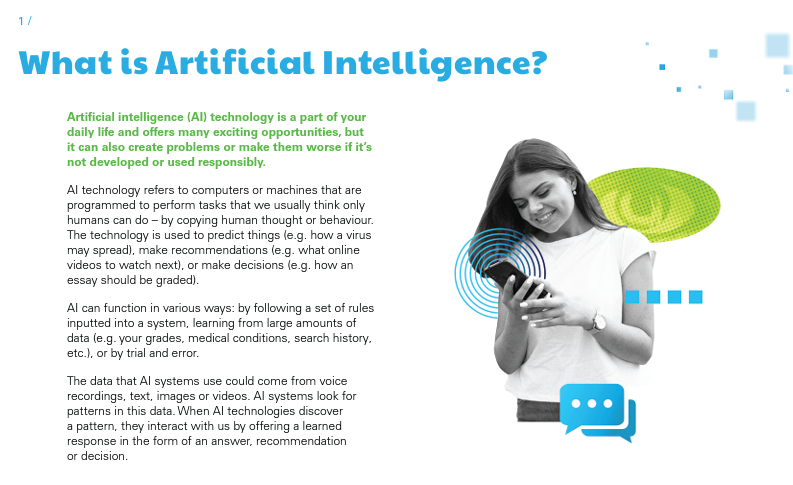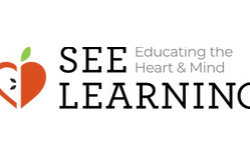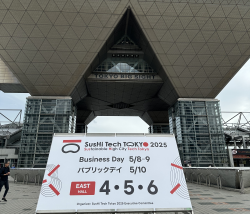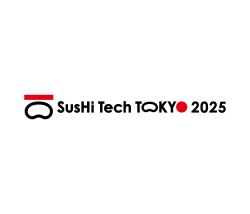AIとどうのようにつきあうか?
2023.09.20
AIは、自動車、エアコン、スマートフォン、パソコン、検索エンジンなど、日常の多くのところで使われています。最近は、教育での利用方法について世界中で議論が行われており、ユニセフ、国連、ユネスコなどの国際的な機関が、AIの利用方法に関するガイドを公開しています。
本校では、生徒たちがAIについて基本的な知識を持ち、責任ある判断をしながら使えるようになる必要があると考え、ユニセフが作成したの「ティーンのためのAIガイド」を翻訳してSTEAMの時間で教えました。

授業では、「AIがどのように学習するか」、「AI技術そのものには善悪はなく、誰がどのように作ったか、どのように使うかに依存すること」などを説明しました。授業後、生徒たちからは様々なコメントが寄せられ、AIについて考える良いきっかけになったと思います。以下は、生徒達からのコメントです。
●AIが子供たちの役に立つようにするためには、学校でAIについての教育を必修科目にするなど、AIの危険性を学ぶ場所を作るべきだと思う。
●子どもたちに寄り添って成長を促すような子育てロボットがあったらいいと思う。共働きの家庭でも子供が一人にならないようにしたい。
●子供向けのAIで、子供の疑問に答えられるような機能をつくる。
●ロボットに自我を持たせないようにしつつ、AIを扱うこれからの人たち自身も今まで以上に、主体性、行動量、洞察力など人にしかない部分でしっかりと個性を出せるようにしていけるようにするべきだと思う。
日本語のスライドが必要な方はimai(アット)jiyugaoka.ac.jpまでご連絡下さい。
AI is used in many everyday applications, including automobiles, air conditioners, smartphones, computers, and search engines. Recently, there has been a worldwide debate about its use in education, and international organizations such as UNICEF, the United Nations, and UNESCO have published guides on how to use AI.
We believe that students need to have a basic knowledge of AI and be able to use it responsibly and judiciously, so we translated UNICEF’s AI Guide for Teens and taught it during STEAM time.
In the class, we explained how AI learns, and that AI technology itself is not good or bad, but depends on who created it and how it is used. After the class, students made a variety of comments, which we believe provided a good opportunity to think about AI. Below are some of the comments from the students.
–In order to make AI useful to children, we should make a place for them to learn about the dangers of AI, for example by making education about AI a compulsory subject in schools.
–I would like to have a child-rearing robot that would be close to children and encourage their growth. I want to make sure that children are never left alone in a dual-income family.
–Create an AI for children that can answer their questions.
–While we should make sure that robots do not have egos, we should also make sure that the people of the future who will be dealing with AI can themselves, more than ever before, be able to express their individuality in areas that are unique to people, such as initiative, amount of action, and insight.

-
今井 朝子(株)日立製作所にて研究開発に従事した後、アメリカの企業にて東京大学とイリノイ大学とのVRの国際研究プロジェクトに参加し、アプリケーション開発に従事。その後ユーザビリティーに関するフリーランサーとして多数企業の新規事業提案等に携わる。現在、総務省情報通信審議会専門委員、Salzburg Global Fellow(世界をより良くするために活動しているリーダーのための国際NPO)、Karanga執行役員(社会性と情動の学び、生きる力の学びを広めるために活動している国際アライアンス)群馬県非認知教育専門家委員会委員、SEL Japan 運営メンバーを兼務。
<経歴>
・慶應義塾大学理工学部卒業
・慶應義塾大学大学院理工学研究科物理学専攻 修士課程修了
・イリノイ大学コンピュータサイエンス科 修士課程修了
・東京大学大学院工学系研究科先端学際工学専攻博士課程修了


 LINE
LINE


